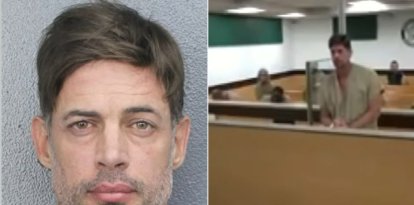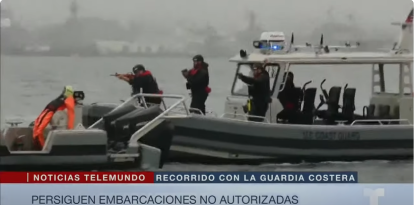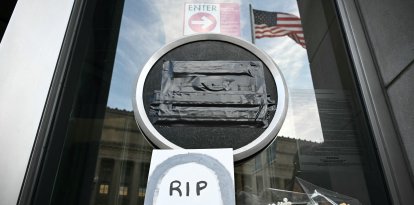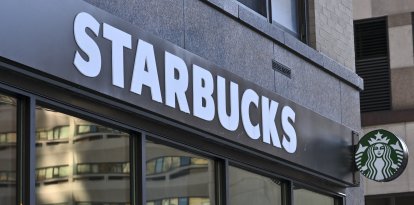Your car got stolen? Go find it in Africa
Authorities in the United States and Canada warn of the booming business of selling stolen vehicles in Africa in North America.
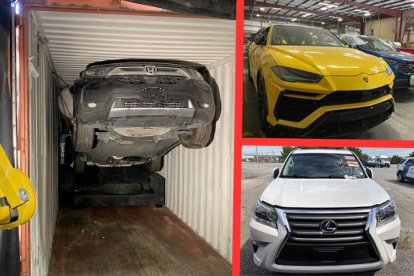
(CBP / Voz Media)
"Mercedes Benz C300 4Matic available," reads the social media post. The car is white, with only one month of use. The license plate looks like a standard Florida plate: green letters with oranges and flowers on a white background. That same license plate -IF5 BKK- appears on several vehicles promoted by the same seller. To buy them, you'll have to go to Nigeria.
This could be, according to the Daily Mail, an example of the booming sale in West Africa of stolen cars from the United States and Canada.
https://www.tiktok.com/@dpgglowauto/video/7278470619371441413?is_from_webapp=1&sender_device=pc&web_id=7280109833570764320
https://www.tiktok.com/@dpgglowauto/video/7279465289534737669?is_from_webapp=1&sender_device=pc&web_id=7280109833570764320
The dealership, called DPG Glow Auto, advertises its cars on Instagram as "foreign" and "used." The description is followed by an American flag emoji.
In videos uploaded by DPG Glow Auto, the vehicles, which were supposedly brought from the United States, are taken out of a container using improvised ramps.
https://www.tiktok.com/@dpgglowauto/video/7225740843515202822?is_from_webapp=1&sender_device=pc&web_id=7280109833570764320
Although it is unclear whether DPG Glow Auto is part of the stolen car trafficking networks, Voz Media tried to contact them but did not get a response. The Department of Homeland Security investigators told ABC 7 that 10% of cars stolen in the U.S. end up abroad. In Canada the percentage climbs to 80%, according to the Daily Mail. Three years ago, Customs and Border Patrol spoke out about an "epidemic of stolen vehicles." The problem has gotten worse.
"This is not just a local crime issue — it’s a national and international issue with multistate and global crime rings," Congressman Josh Gottheimer said earlier this year. Therefore, he called for collaboration between agencies at different levels and even called for the creation of a National Auto Theft Task Force to help tackle these problems.
Canada's public broadcaster managed to connect a vehicle in Ghana with its owner in Toronto. "It was stolen in September, October last year," Leonard Green told CBC reporters. "That's crazy."
What do you want my car for?
The objective of these crimes is not only to profit from their sale by advertising them through different channels such as online marketplaces. This is also used to finance other illicit activities.
"Transnational criminal organizations use stolen vehicles as a form of currency to fund their illicit enterprise," said Stephen Maloney, director of CBP operations in Baltimore.
In the case of Canada, police found gangs based in Montreal responsible for most of these crimes. According to local media, smaller and inexperienced groups have also made their way into the business. Many are looking to take advantage of the growing business.
Cut off the flow
CBP's Baltimore office boasts of being number one nationally in operations against stolen cars. In 2022 it intercepted 239 stolen vehicles, with a combined value of $11,488,978. Twenty percent of the total of 1,235 recovered by the agency throughout the country.
95% of the cars intercepted by CBP Baltimore were ported to countries in West Africa. With 49 vehicles, Sierra Leone was the most frequent destination. It was followed by Togo (43), Ghana (35), Nigeria (27) and Liberia (26).
The most expensive car they intercepted was a Bentley Bentayga, valued at $187,600.
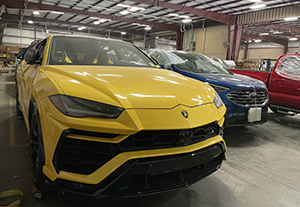
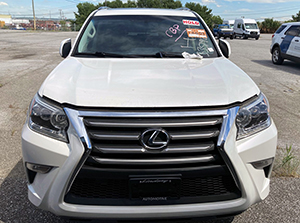
This is nothing new. In the last five years, the Baltimore CBP recovered 890 vehicles. That makes about 178 per year, on average.
"Rigorous import and export examinations remain a critical component to CBP’s border security mission," explained Baltimore Director of Operations Stephen Maloney. To detect stolen cars, agents compare the vehicle identification number (VIN) — 17 characters that encode specific information about each vehicle — with reports of thefts.
Another key to disrupting stolen car traffic is collaboration between local and federal agencies. As CBP Port of New York-Newark Director TenaVel T. Thomas believes, "It's the cornerstone of our recent success."
When Thomas made those statements in February of this year, a multi-agency operation had just recovered 23 stolen cars that were to be transported to Togo, Ghana, Burkina Faso and Liberia, all in West Africa.
The value of the vehicles ranged from $26,600 – for a 2020 Hyundai Tucson – to $155,850 – for a Mercedes Benz G55. CBP then estimated that a total of $1,333,425 in stolen cars was recovered.
109 rounds of ammunition were also found inside a black car destined for Nigeria.
Efforts to disrupt this illegal flow are also taking place on the other side of the ocean. In May, the U.S. Embassy in Ghana reported that, while working with local authorities, they had identified more than 100 luxury cars in the African country that had been stolen from U.S. and Canadian soil.
Ghana's Economic and Organized Crime Bureau (EOCO) estimated there were about 400 luxury cars that may have been stolen from North America.
In April, the EOCO shared data from about 100 cars, ordering their 'new owners' to hand them over to authorities. Otherwise, they would be confiscated. In screenshots shared by The Ghana Report, you can see that the information includes the make, model and identification number.
RECOMMENDATION
